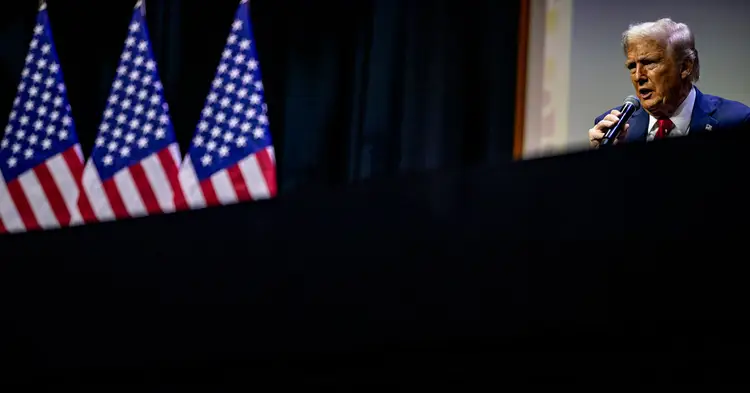Opinion | Trump Has Become Unmoored in Time

October 14, 2024, at 7:00 PM Eastern Time
This is the second post in a series that explores Donald Trump's rhetoric and its implications for the upcoming election.

Do you recall the electricity crisis in California during 2000 and 2001? I certainly do, as I extensively covered the topic back then and took a risk by suggesting, based on indirect evidence, that market manipulation was likely a significant contributor. One of my economist peers even accused me of being overly dramatic, but later, we obtained solid proof of such manipulation—recordings of Enron traders colluding with power company executives to fabricate shortages in order to inflate prices.
Reflecting on that experience, I found myself more understanding than many economists when it comes to the argument that price gouging contributed to the recent rise in inflation, although I don't think it was a key factor. Nevertheless, that’s all in the past now; apart from a few power outages during a heat wave in 2020, California hasn't faced significant electricity shortages in many years.
However, keep this from Donald Trump. During a lengthy and at times confusing speech to the Detroit Economic Club on Thursday, he claimed, “We don’t have electricity. In California, people experience brownouts and blackouts every week. And when I say blackouts, I mean the place is completely out of power, totally broke.” This statement is false; it was false when he made similar claims last year, and the 39 million residents of California can attest to that. It seems that in Trump’s perspective, the electricity crisis from years ago has never truly come to an end.
There's a clear similarity with Trump's comments about crime. He has claimed that in large urban areas, "You can't even cross the street to buy a loaf of bread. You risk being shot, robbed, or assaulted, among other dangers."
There was a time when the major cities in America felt quite unsafe. I can recall when large areas of New York were essentially off-limits. But that was a long time ago. Between the early 1990s and the mid-2010s, there was a significant drop in the national murder rate, and although there was an increase during Trump's final year in office, it appears to be lessening now. New York's transformation into one of the safest cities in the country has been remarkable: last year, the murder rate was 83% lower than in 1990, and both my neighbors and I feel comfortable walking to the local bodega for bread without fear.
It's clear that a lot of what Trump says regarding crime is a calculated move to provoke fear for his own political advantage. The same goes for some of his other inaccurate statements, such as claiming that the Biden administration is neglecting Republican areas hit hard by hurricanes and misdirecting disaster relief funds to migrants. I'm not sure if Trump actually believes that all the jobs created during Biden's presidency have been filled by "illegal migrants," but I’m confident that he isn't concerned about the truth of his statements.
However, it feels like there’s something deeper than just cold calculation behind some of Trump’s exaggerated statements. It seems he might truly believe what he’s saying, as if he’s lost track of time. Take crime, for instance; I imagine that in Trump’s mind, it’s still 1989. That was the year he famously bought a full-page advertisement urging New York State to reinstate the death penalty following the assault of a woman who was jogging in Central Park. This incident led to the wrongful conviction of five teenagers.
Concerns about electricity and crime in cities are not the only areas where Trump's perspective on America appears outdated. In his speech in Detroit, he made a surprising move for a candidate who was expected to win over the audience in a key battleground state: he criticized the city that welcomed him, stating, “If Kamala Harris comes out on top, our entire nation will become like Detroit.”
It would be fantastic if that were the case: Detroit has undergone a significant economic revival and is now seen as a model for other struggling cities globally, especially for its thriving startup scene. However, I find it hard to believe that Trump is aware of this or that it matters to him. In his eyes, Detroit likely still represents the economic challenges faced by the industrial Midwest back in 2010.
The main takeaway is that there's a recurring theme at play. Numerous commentators have pointed out that Trump often portrays a bleak version of America that doesn’t reflect the actual situation. However, what hasn't been highlighted as frequently is that his constructed nightmare seems to be a collage of previous instances of chaos and dysfunction. It appears that these memories have stuck with him, and likely because he tends to overlook intricate details and is insulated by his wealth and privilege, they continue to influence his perspective.
Trump often tends to belittle the intelligence of his rivals. He has referred to Harris as “mentally disabled” and a “dummy.” Additionally, he has demanded that CBS be stripped of its broadcasting rights after a routine edit of a “60 Minutes” interview featuring her, where she, being a former prosecutor, appeared quite intelligent, regardless of one's views on her policies.
What might Trump say about a rival who, similar to him, appears to be anchored in the past, frequently portraying America in a manner that implies he’s unaware of the current times?
Paul Krugman has been writing opinion pieces since 2000 and is a prominent professor at the Graduate Center of the City University of New York. He received the Nobel Memorial Prize in Economic Sciences in 2008 for his research in international trade and economic geography. @PaulKrugman
This article has also been published in print in Section ____ on ____.
from the New York version
Trump Seems Disconnected from Reality. Request Reprints | Today's Edition | Sign Up









































